Revisiting Linux Part 1: A Look at Ubuntu 8.04
by Ryan Smith on August 26, 2009 12:00 AM EST- Posted in
- Linux
CPU Benchmarks
We’ll start our short look at Ubuntu’s performance with our CPU intensive benchmarks. Up first is SuperPi, a single-threaded pi-calculating benchmark. Here we time how long it takes to calculate Pi to 1 million digits.
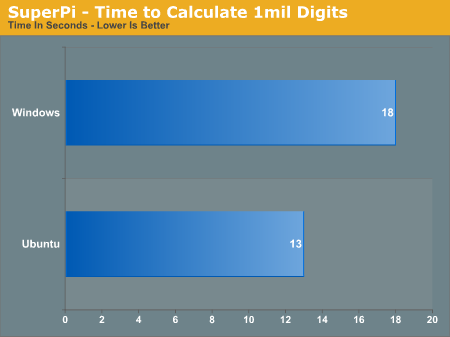
We ran this test several times more than usual just to make sure we weren’t seeing any kind of error. The Linux version of SuperPi really is about 30% faster than the Vista version. Keep this in mind, this will be an important point later.
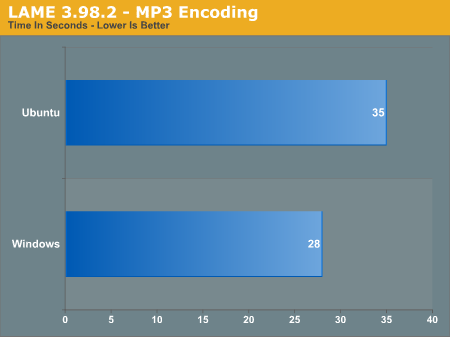
Meanwhile the situation for LAME is inverted. Vista outscores the Linux version by nearly 20%.
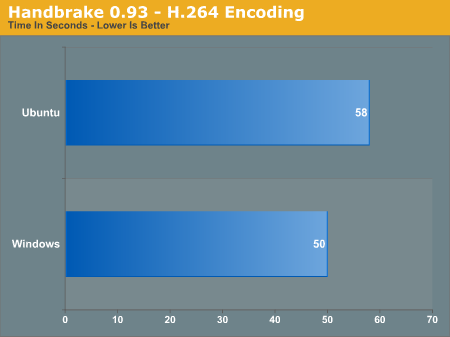
Using the cross-platform X264-based Handbreak for our video encoding test, Vista once again pulls ahead of Linux.
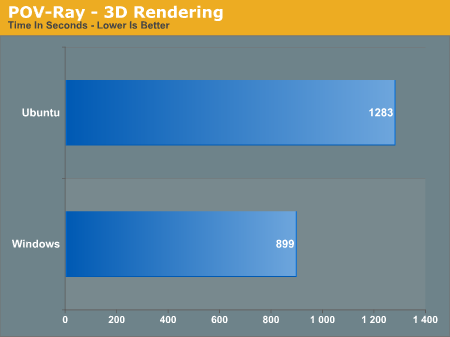
Once more Vista is ahead by a large margin.
From what we can tell, there’s little-if-any innate performance advantage to Vista or Linux in these benchmarks. Our working theory is that the performance difference comes down to the compiler used. Many Linux applications are compiled with GCC, while for Windows it’s either the Visual Studio compiler, or Intel’s own compiler (which is also available for Linux). There’s also a matter of compiler settings, as we saw in our quick breakout of Firefox benchmarks.
Meanwhile SuperPi uses a lot of hand-rolled code, although we’re still not sure why it’s outperforming Vista on Linux by as much as it is.
To shed a little more light on this idea of compiler performance, we have a few benchmarks of Windows application performance under Ubuntu through Wine.
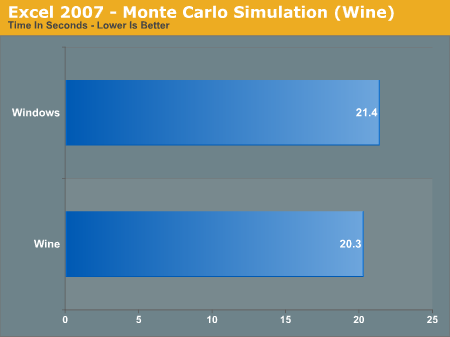
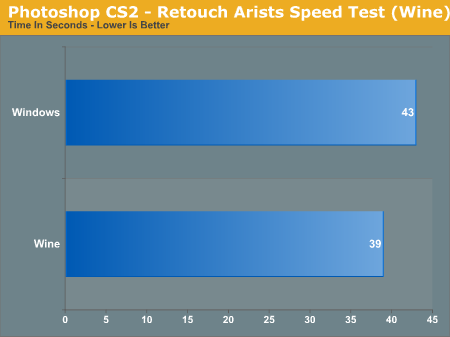
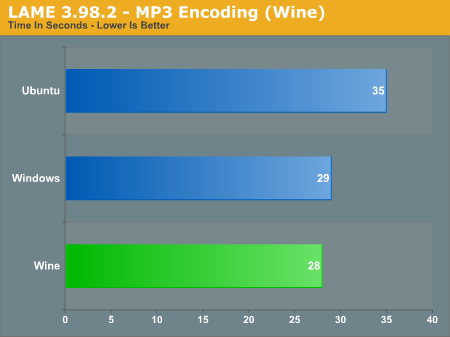
Here we see a most amazing thing: Ubuntu is outperforming Windows at running Windows applications! As we’ve removed the influence of compilers the Photoshop results are particularly interesting. From what we can tell it’s normally as fast under Linux as it is Vista, however there seems to be a short gap of low-CPU usage when running it under Vista that doesn’t occur when running it under Ubuntu. As a result Ubuntu finishes a few seconds earlier.
There are a number of conditional cases that mean that applications running under Wine don’t always match or beat Windows performance, but in our tests there’s no performance hit to using Wine to run Windows applications.
These results also lend a great deal of support to the idea that there’s a significant difference in performance between the two operating systems due to their compilers. This goes particularly for the LAME benchmark, where the performance gap melts away under Wine. This is something we’re going to have to look in to in the future.










195 Comments
View All Comments
Eeqmcsq - Wednesday, August 26, 2009 - link
for your time spent on writing this article. I've made the jump to from Windows to Ubuntu (and Xubuntu for my older computers) back around 7.10 and 8.04 and I went through some of the headaches in adjusting to Ubuntu, but I eventually solved all of them and I'm quite settled in now.One comment about finding help in the form of command line instructions, rather than GUI instructions. GUI instructions for Ubuntu would not be useful for Kubuntu or Xubuntu, since they use different window managers. The command line solutions usually work for all three.
Also, boot times were noticeably improved in 9.04. Perhaps you can run a quick retest on it.
And you CAN install stuff when using the live CD. I've installed a couple of temperature monitoring utilities when I was stress testing my motherboard.
Finally, thanks again for writing such a thorough look into your Ubuntu experiences. It was a great read in seeing how far Ubuntu has come and what it still lacks.
fepple - Thursday, August 27, 2009 - link
Yeah, you can set the APT sources to use a CD. There is an option for it 'system' > 'administor' > 'software source', or you can edit the /etc/apt/sources.list fileclarkn0va - Wednesday, August 26, 2009 - link
[quote]since SMB is the predominant protocol for consumer file server gear, it’s a fair test of such use.[/quote]While this comment is not false, it presents a lazy approach to comparison; it's a one-sided contest, and Linux, pitted against Windows on home turf, doesn't stand much of a chance.
You as much as acknowledge this in the article, so why not provide some counterpoint? For example, consumer file server gear, even if it supports SMB almost ubiquitously, is usually *nix-based. So instead of just showing Windows and Linux clients interacting with Windows servers, show them interacting with *nix servers as well. Do some NFS transfers as well; NFS is well supported in consumer NAS these days.
You also really missed the boat on the video drivers. 8.04 was not the first Ubuntu release to include the Restricted Drivers Manager (known simply as "Hardware Drivers" in later releases). This handy app will identify hardware, such as AMD and NVIDIA GPUs, that can take advantage of proprietary drivers, and will offer to to install the same via synaptic (APT) with just a click of the mouse. No CLI, no headaches.
Still, a thorough review, and generally well-researched. I'm looking forward to the 9.04 follow-up.
Since you mentioned hardware HD decoding, I recommend taking a look at smplayer from the testing ppa (https://launchpad.net/~rvm/+archive/testing)">https://launchpad.net/~rvm/+archive/testing). Unfortunately vdpau doesn't work with the nvidia blobs in the default Ubuntu repos, but I believe there's a PPA providing vdpau-compatible blobs for anybody not wanting to do CLI installs.
db
VaultDweller - Wednesday, August 26, 2009 - link
[quote]While this comment is not false, it presents a lazy approach to comparison; it's a one-sided contest, and Linux, pitted against Windows on home turf, doesn't stand much of a chance. [/quote]This isn't Linux pitted against Windows on home turf, it's Linux pitted against Windows in the real world.
clarkn0va - Wednesday, August 26, 2009 - link
Well, no doubt SMB is the dominant method of sharing files for consumers in general. Obviously comparing Linux to Windows makes sense in a world where Windows is the incumbent, but it's not the whole story.I hope Part 2 will address some of the objective benefits of Ubuntu, and not fall into the trap of "worse because it's not the same as Windows".
VaultDweller - Wednesday, August 26, 2009 - link
I agree in principle, but there has to be a distinction between "Worse because it's not compatible with Windows," "Worse because it's not as easy as Windows," and "Worse because it's not the same as Windows." Die-hard *nix advocates tend to dismiss the first two as if they were the latter, and this tends to undermine their argument.Also, in some cases "Worse because it's not the same as Windows" can be a valid point, because the public has been trained to the point that the Windows way is the "intuitive" way. Of course, this isn't truly intuitive, as people who learned Linux first would find Linux methodologies more intuitive - but that's largely a moot point, as that's not the reality we live in today. You could say the same thing about the color red - in the western world, when we see red we can intuitively guess that it means Stop, or Warning, or Error, etc. The fact that this is not an understanding we're born with but rather a socially acquired intuition does not mean it would be any easier to suddenly change the color of traffic lights and expect people to adjust without problems.
Ryan Smith - Wednesday, August 26, 2009 - link
All of the NAS gear I can get my hands on is either SMB only, or is a Time Capsule which is SMB + AFP. I don't have anything that does NFS, which isn't so much a comment on testing (I could always set up another box) as it is usefulness. NFS just isn't common on consumer gear; SMB is a more important metric if you're looking at file transfer performance, because that's what most people are going to be working with. This doesn't preclude doing NFS at a later time though.And the Restricted Drivers Manager is limited to the drivers in the Hardy repository, which means they're a year+ out of date.
amrs - Wednesday, September 30, 2009 - link
Interestingly, if one checks the SmallNetBuilder NAS charts, it looks like out of 87 NAS devices, 49 have NFS. 56% in other words. And you say NFS isn't common? Really now? Seems a little biased to me.ekul - Wednesday, August 26, 2009 - link
While a lot of your issues have complicated solutions or lengthy technical backstories I can solve your complaint of smb shares mounted in nautilus not being useful in non-gtk applications in one simple command (or as you seem to hate commands the gui can do it too).theory: make a symlink to the directory nautilus mounts to so it can be easily accessed. Symlinks to directories or files are transparently (to users and applications) identical to the location they refer to. Windows doesn't have symlinks (only useless shortcuts) so it isn't surprising you were not aware to do it.
howto: gvfs uses the directory /home/$USER/.gvfs as a mount point so link to it:
ln -s ~/.gvfs ~/linkname
howto gui: in nautilus go to your home folder then choose view -> show hidden files. Right click on .gvfs and choose make link. Then you can rename the link to whatever you want and hide hidden files again.
hint: symlinks are your best friend. My home dir is littered with links to places on the filesystem I visit a lot to avoid a lot of clicking/typing
Ryan Smith - Wednesday, August 26, 2009 - link
I suddenly feel very humiliated...The symlink is a very elegant solution, I'm embarrassed I didn't think of that myself. It's a bit of a lousy solution in that there even needs to be a solution, but as far as things go that's a very insightful suggestion.